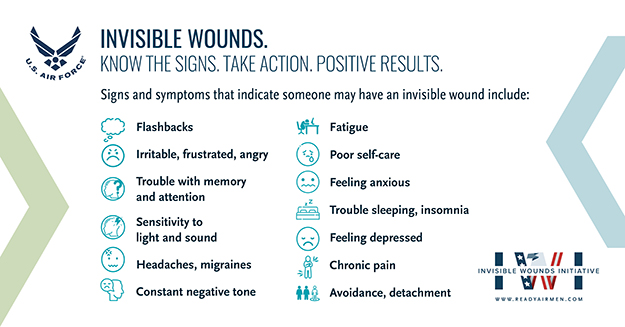As part of the ongoing Invisible Wounds Initiative Command Team Campaign launched by Gen. Charles Q. Brown, Jr., Chief of Staff of the Air Force, and Gen. John W. "Jay" Raymond, Chief of Space Operations, the service is working to improve the perception of invisible wounds, remove barriers to care, enhance the continuum of care process, and provide an equitable and supportive environment for those living with invisible wounds.
The campaign, launched in October 2021, calls on each command team to act - to lead, support, and engage airmen and guardians living with invisible wounds.
An invisible wound is a cognitive, emotional, or behavioral condition that can be associated with trauma or serious adverse life events. Examples of possible diagnoses are major depressive disorder, post-traumatic stress disorder and traumatic brain injury. Awareness and support from leadership significantly influence conversations about mental health and show airmen and guardians that seeking care is a sign of strength.
The Command Team Campaign is a communications effort to increase knowledge and enable command teams to build connectedness, trust, and openness to tough conversations. CSAF and CSO have asked commanders to implement the campaign strategies and use the resources that have been proven successful in pilots at Joint Base Langley-Eustis, Virginia, and Joint Base Andrews, Maryland. To enable command teams, the IWI developed the Invisible Wounds Command Team Guide and Toolkit, designed to help commanders engage their teams, build knowledge and understanding of invisible wounds, and continue to make substantive changes to address mental health openly and honestly.
The guide and toolkit provide command teams with all the information and materials needed to implement the campaign and drive positive change. Command teams can leverage consistent internal communication channels to share information through email, all-hands, and newsletters, as well as spread messages to a wider audience using wing and squadron-level social media platforms. Fact sheets and informational resources are included for leaders at all levels to use in their daily conversations with airmen and guardians. The guide and toolkit also contain print resources to catch the attention of airmen and guardians in high traffic areas with visual content on posters, table tents, and other materials.
"Leaders drive culture and enable aairmen, guardians, and families to perform at their best, both at work and home," said Lt. Col. Michael Shick, director of Warrior Wellness and Policy Integration, Secretary of the Air Force/Manpower and Reserve Affairs (SAF/MR).
The Command Team Campaign was developed as a result of two successful culture change pilot programs to improve the awareness, communication, and help-seeking behavior around invisible wounds. The IWI piloted these culture change efforts at Joint Base Langley-Eustis and Joint Base Andrews using digital and physical communication products to promote awareness and engagement, as well as by embedding invisible wound topics into training courses.
In addition to communications and culture change activities, the IWI has implemented numerous solutions that drive timely, proactive case handling, engaged leadership, supportive environments, and accessible, effective care delivery. The program established an Invisible Wounds Clinic that significantly improved identifying, diagnosing, treating, and reintegrating airmen and guardians with TBI and/or PTSD. Additionally, the team has integrated invisible wound concepts into the Basic Military Training, Leadership Development Course for Squadron Command, and Office of Disability Council curricula, including the development of self-paced IWI training videos. Another program initiative was to develop validation criteria and the process to identify policy barriers, which has been completed, as the team continues to evaluate initially identified policy items and recommend solutions for mental health barriers.
"With the Invisible Wounds Initiative, I feel like we're moving in the right direction. It's the natural progression in our understanding for how to best care for our service members," says Maj. David Schonberg, director of Manpower & Personnel, Headquarters, District of Columbia Air National Guard. "From ‘shell shock' in WWII, to PTSD and TBI, we've learned so much about the warning signs and symptoms of invisible wounds. This initiative provides our teammates with simple yet meaningful tools and resources so that together, we become a powerful safety net to help look out for one another."





Read Comments